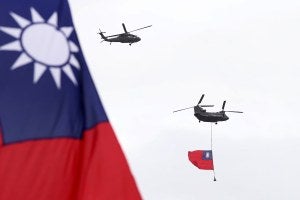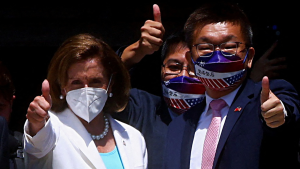But most oppose sending US troops to the island should China invade.
Two surveys—the 2022 Chicago Council survey of the American public and a 2022 Chicago Council-University of Texas survey among foreign policy opinion leaders from different professional groups1—find bipartisan consensus on how the United States should respond to a potential Chinese invasion of Taiwan. Majorities of both the public and opinion leaders say the United States should aid Taiwan through all measures short of sending US troops to Taiwan itself, including imposing sanctions against China and sending arms and military supplies to Taipei. Opinion leaders and the public are less in sync when it comes to the role the United States should play in coordinating an international response to China’s rise: large majorities of leaders across party lines say the United States should play a leading role, while the public prefers a supporting role.
Key Findings
- Should China invade Taiwan, bipartisan majorities of opinion leaders and the public favor a range of policies to support Taipei, including sending additional arms and military supplies to the Taiwanese government and using the US Navy to prevent China from imposing a blockade.
- Leaders and the public alike oppose sending US troops to the island should China invade, though Republican opinion leaders are divided.
- In a separate question that only asks about a US military response to a Chinese invasion of Taiwan, majorities of Republican (73%) and Independent (59%) opinion leaders favor the use of US troops. Democrats (53%) and the public (54% overall) oppose doing so.
- Across partisan groups, opinion leaders view China’s territorial ambitions as a critical threat to the United States, while the public is more divided.
- Large majorities of leaders say the United States should take a leading role in coordinating an international response to China’s rise
Leaders, Public Show Bipartisan Support for Aid to Taiwan—but Not US Troops
As US-China relations have moved from cooperation to competition, perhaps no issue has loomed larger than that of Taiwan. Recent high-level visits of Taiwanese and American delegations to each others’ countries, US arms sales to Taipei, and discussions in the United States about greater commitments to the defense of Taiwan have all raised Beijing’s ire.
While tensions between Beijing and Washington remain high, American opinion of China has never been lower: 32 on a 0–100 scale, the lowest result in over 40 years of Chicago Council Surveys. That dislike may be one reason for the unified views of the American public and foreign policy opinion leaders should a war break out across the Taiwan Strait.
In the event China invades Taiwan, opinion leaders and the public both support a range of policies aimed at aiding Taipei. Overwhelming majorities of opinion leaders—more than nine in 10 across party lines—say the United States should impose economic and diplomatic sanctions on China, accept Taiwanese refugees, and send additional arms and military supplies to the Taiwanese government. Large majorities of opinion leaders, including Republicans (91%), Independents (84%), and Democrats (80%), also favor using the US Navy to prevent China from imposing a blockade around Taiwan. While leaders are far more unified in their responses, smaller majorities of the public across party lines similarly support all four of these policies
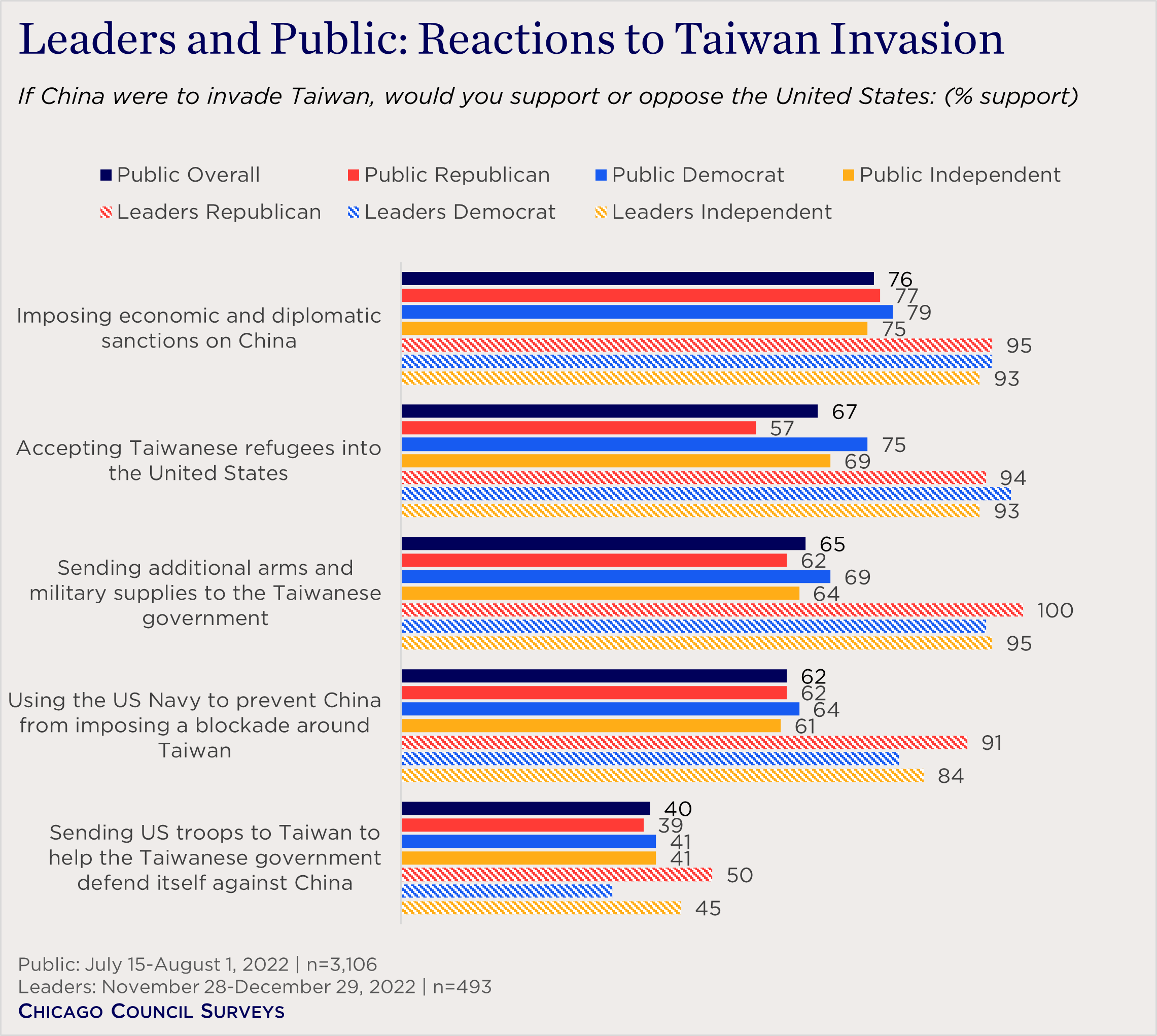
Where both the American public and opinion leaders draw the line is the direct involvement of US troops. Among leaders, only half of Republicans (50%) and minorities of Independents (45%) and Democrats (34%) support sending US troops to Taiwan to aid Taipei. Similarly, only four in 10 Americans overall (40%) favor sending US forces to the island, with little variation among partisans.
If Force Is the Only Option, Leaders Are More Likely to Favor US Defense of Taiwan
Interestingly, opinion leaders’ responses to the question of whether to involve US troops in a conflict between China and Taiwan varies somewhat depending on how the question is framed. In a question asked earlier in the survey that only provides an option to send US troops under a variety of scenarios, the public and opinion leaders are somewhat more willing to support the use of US forces to defend Taiwan. This framing effect is particularly strong for opinion leaders. Three-quarters of Republican leaders (73%) would favor the use of US troops, as would a majority of Independents (59%); Democrats are narrowly opposed (47% favor, 53% opposed). This wording also slightly increases public support for a US military response, though Americans remain narrowly opposed across partisan groups.
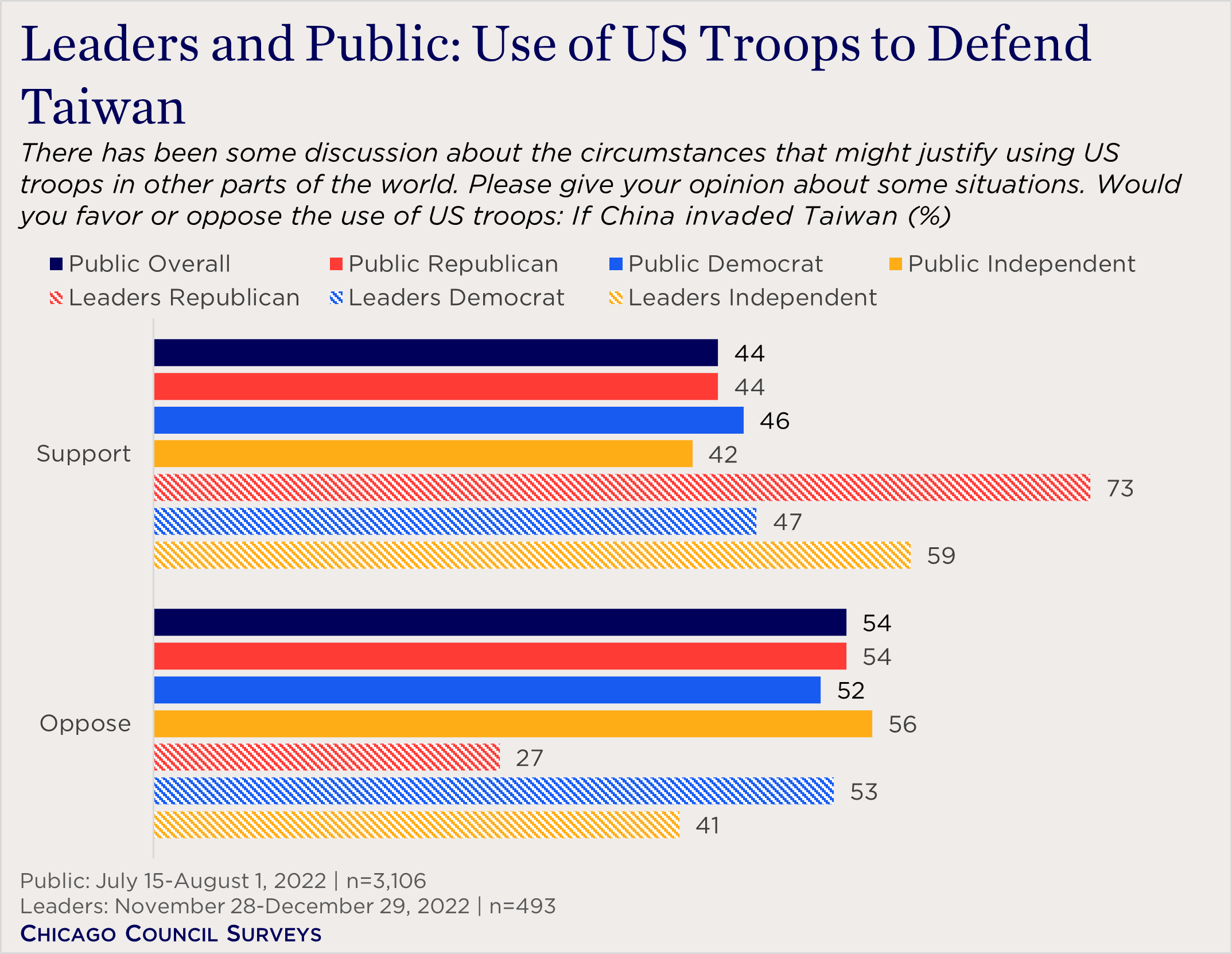
Leaders—Especially Republicans—View Chinese Ambitions as a Threat
The greater willingness of opinion leaders to commit US forces to a conflict with China partly reflects their greater sense of China’s territorial ambitions as a critical threat to the United States. This is particularly the case for Republicans: majorities among leaders (84%) and the public (62%) view China’s ambitions as a critical threat. Independents and Democrats are somewhat less concerned. Among opinion leaders, majorities of Independents (62%) and Democrats (57%) also view China’s ambitions as a threat, while among the public, about half of Democrats (50%) and Independents (48%) agree.
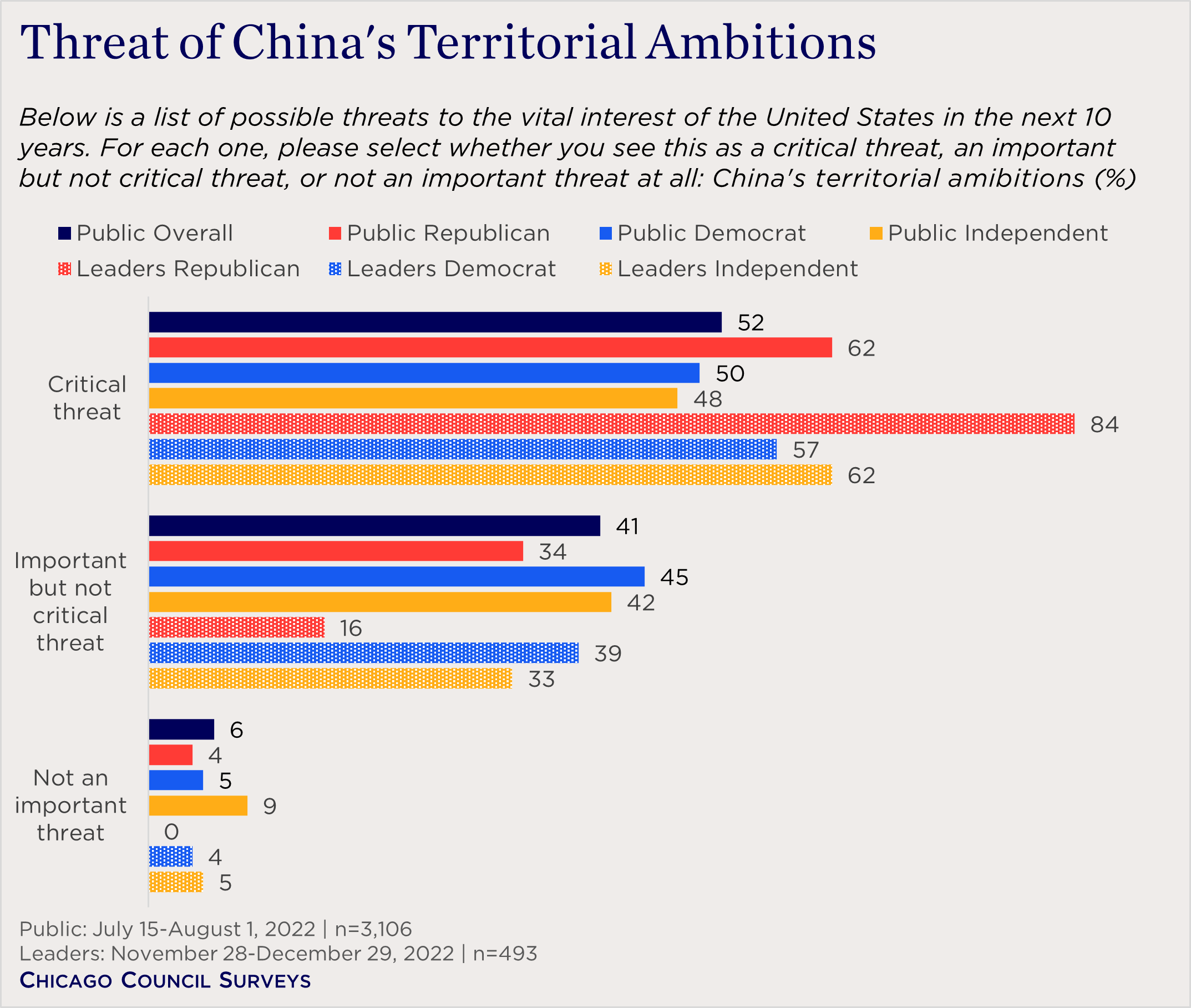
Opinion Leaders, but not the Public, Want the United States to Lead on China’s Rise
Opinion leaders are far more likely than the American public to say the United States should play a leading role in coordinating an international response to China’s rise. Nearly all Republican leaders (99%) and large majorities of Independents (81%) and Democrats (72%) favor a leading role for the United States. By contrast, a majority of Americans overall (53%) say the United States should play a supporting role, including majorities of Democrats (57%) and Independents (54%). Among the public, Republicans are divided, with 45 percent favoring a supporting role for the United States and 42 percent a leading role when it comes to coordinating a response to China’s rise.
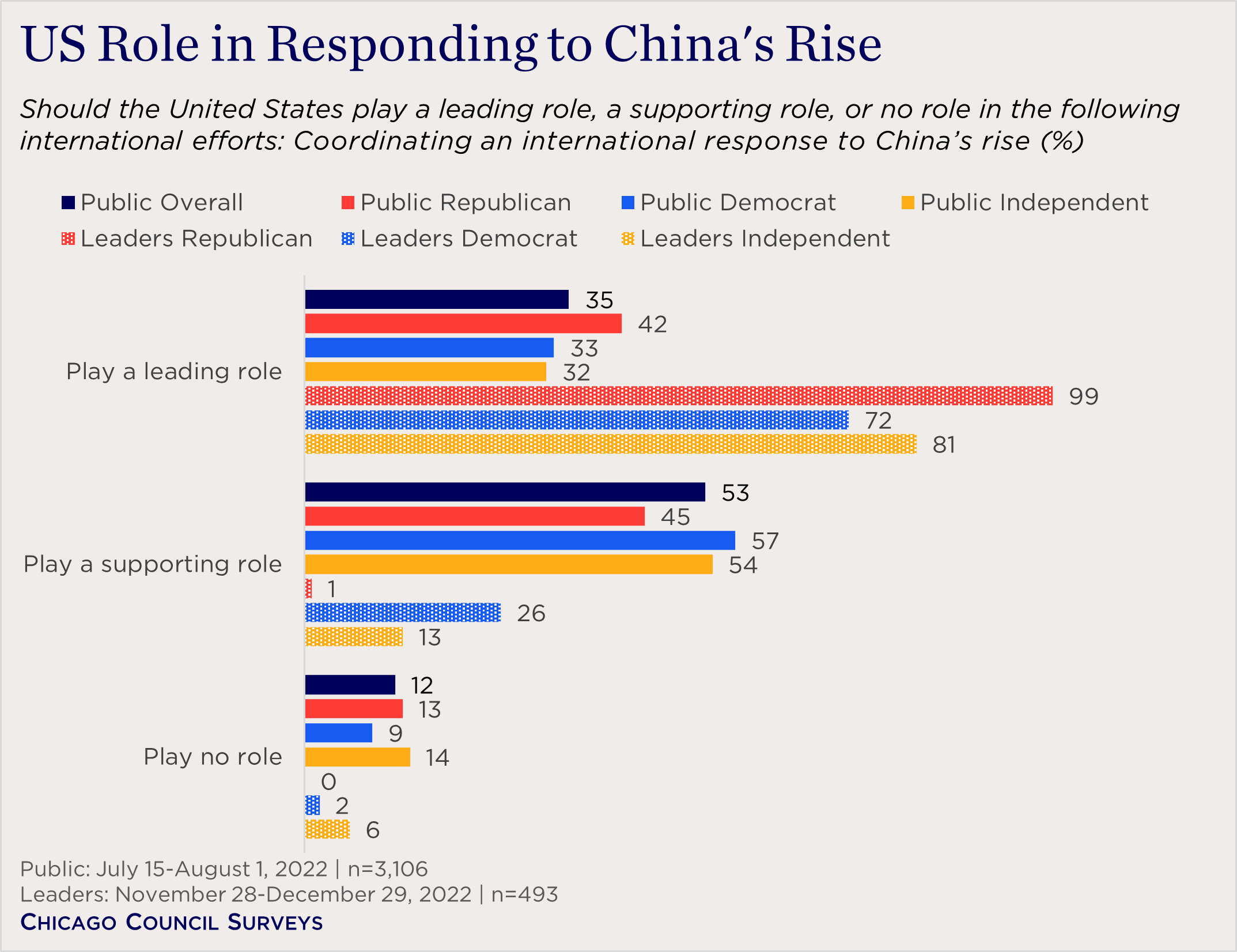
This greater support for a leading role for the United States reflects Republicans’ greater concerns about the rise of China as well as foreign policy leaders’ general inclination for the United States to take a leading role on international security issues such as China’s rise, the war in Ukraine, and nuclear nonproliferation. For other issues such as climate change, the provision of COVID-19 vaccines to other countries, and combating global hunger, leaders and the public are more divided along party lines.
Conclusion
Around the world, the war in Ukraine reminded publics and leaders alike that the risk of interstate war remains a serious threat. And as the 2022 Chicago Council Survey showed, many Americans (76%) thought it was likely that the war in Ukraine would set a precedent and encourage China to invade Taiwan.
Should such an invasion occur, the data show that the public and foreign policy opinion leaders are on the same page when it comes to America’s response. The opinion leader–public division on what type of role the United States should play in responding to the rise of China reflects a strong preference among leaders for the United States to play a leading role in tacking global challenges, with some variation along partisan lines depending on the specific issue. For its part, the US public’s preference to favor a supporting role for the United States across a range of different issue areas could also reflect the public’s desire, as seen in past Chicago Council Surveys, to work with and alongside US allies rather than striking out alone. The public may also feel that US allies in the region can and should do more to respond to China’s rise rather than relying solely on the United States.
- 1
The opinion leaders survey was conducted among 493 foreign policy opinion leaders from different professional groups, including executive branch agencies, Congress, academia, think tanks, the media, and interest groups (including nongovernmental organizations, religious institutions, labor unions, and business).
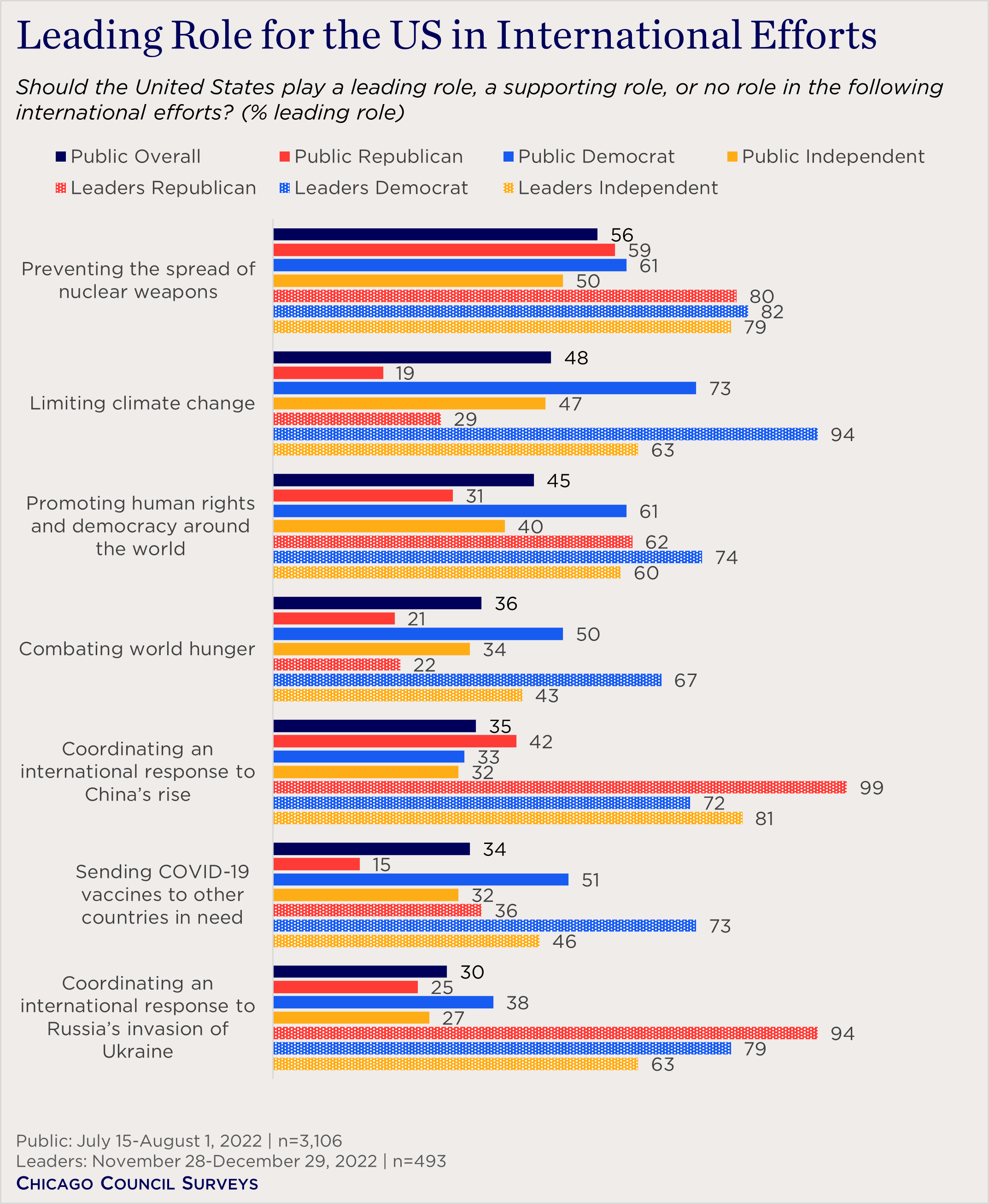
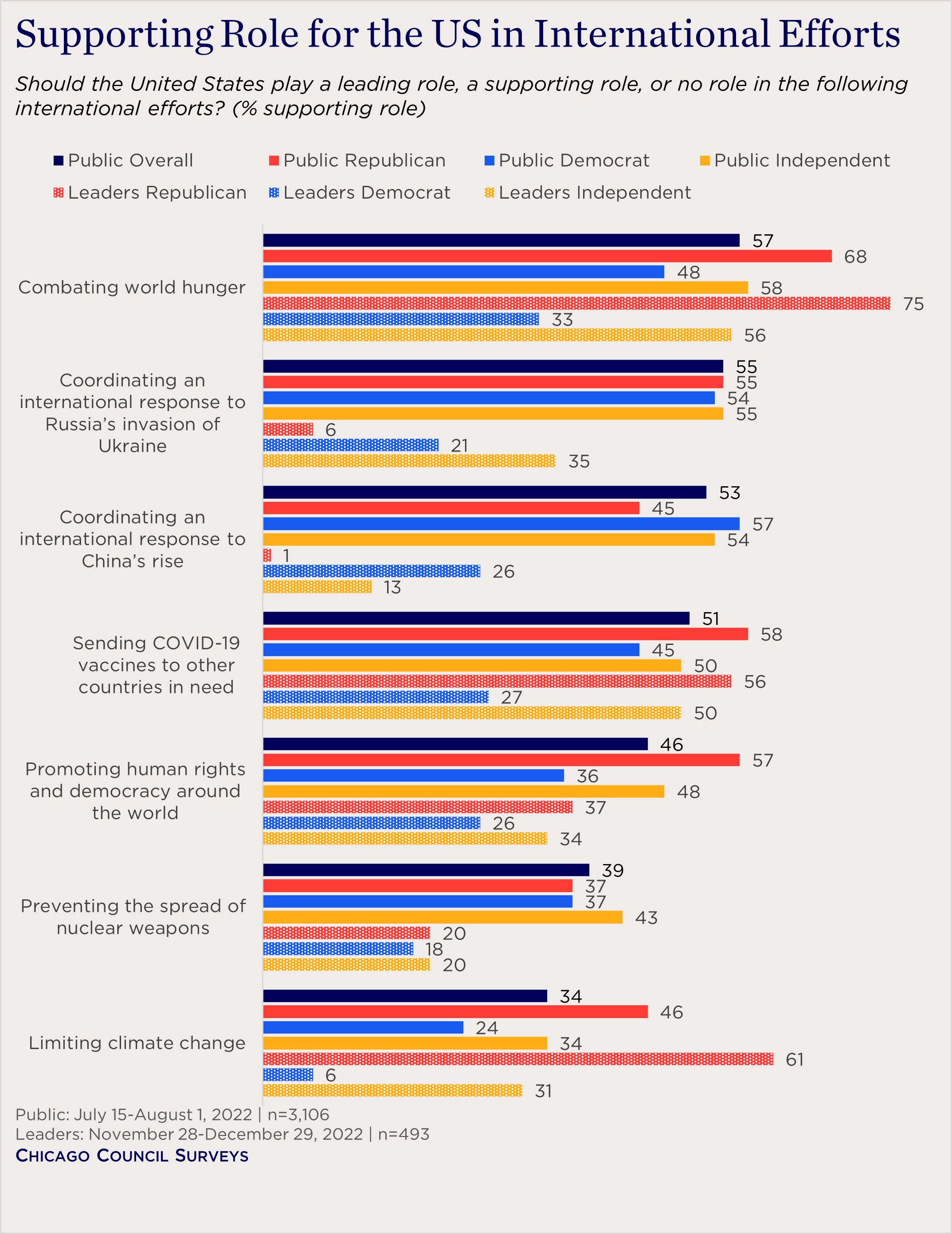
This analysis is based on data from two surveys administered by the Lester Crown Center on US Foreign Policy at the Chicago Council on Global Affairs.
Public data comes from the 2022 Chicago Council Survey of the American public on foreign policy. The public survey was conducted July 15–August 1, 2022, by Ipsos using its large-scale nationwide online research panel, KnowledgePanel, in both English and Spanish among a weighted national sample of 3,106 adults 18 or older living in all 50 US states and the District of Columbia. The margin of sampling error for the full sample is +/- 1.8 percentage points. The margin of error is higher for partisan subgroups or for partial-sample items.
Opinion leaders data comes from the 2022 Chicago Council-University of Texas Survey of Foreign Policy Opinion Leaders. The opinion leaders survey was conducted November 28–December 29, 2022, among 493 foreign policy opinion leaders from different professional groups, including executive branch agencies, Congress, academia, think tanks, the media, and interest groups (including nongovernmental organizations, religious institutions, labor unions, and business). The data is weighted equally by group size and so is not suitable for comparison to past years’ opinion leader data.
In both surveys, partisan identification is based on how respondents answered a standard partisan self-identification question: “Generally speaking, do you think of yourself as a Republican, a Democrat, an Independent, or what?”
The 2022 Chicago Council Survey is made possible by the generous support of the Crown family and the Korea Foundation.








Related Content
 Public Opinion
Public Opinion
Should China invade Taiwan, 2022 Chicago Council Survey data show most Americans would support sending arms but not US troops.
 US Foreign Policy
US Foreign Policy
Should the United States take a more militarized or diplomatic approach in Taiwan-China relations?
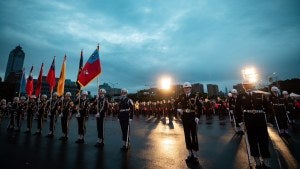 Defense and Security
Defense and Security
Military conscription is a good start, but leaders in Taipei need to act with greater urgency still, Ethan Kessler writes.
